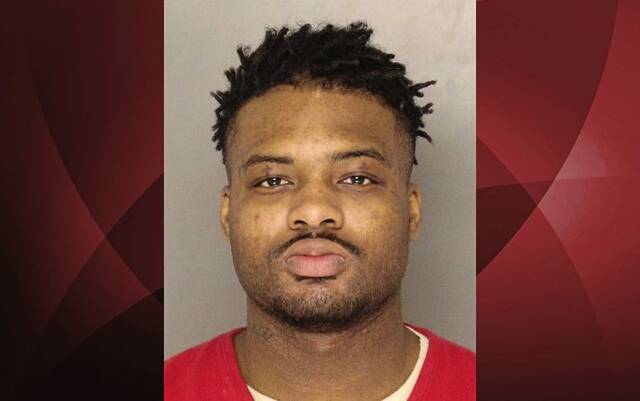https://triblive.com/local/a-dream-destroyed-paralyzed-shooting-victim-tells-court-he-has-no-future/
A dream destroyed: Paralyzed shooting victim tells court he has no future

Four years ago, Kwaku Botwe-Asamoah was in the prime of his life. He worked as a software developer, played basketball and enjoyed traveling.
But that all changed on July 31, 2021, while he was out celebrating his 30th birthday on Pittsburgh’s South Side.
As he headed home that night, Botwe-Asamoah came across two people arguing. He intervened, and a friend of the couple shot him multiple times, paralyzing him from the waist down.
“Before the shooting, I was a 100% healthy, strong and independent young man,” Botwe-Asamoah wrote in a court statement. “I was building a life I could be proud of. I had plans, goals and perhaps most importantly, a dream of becoming a father and creating a family legacy.
“That dream was destroyed the day I was shot.”
On Wednesday, the man responsible, Randy Jones, was ordered to serve 12 to 24 years in state prison.
Jones, 26, of Turtle Creek, pleaded guilty in February to attempted homicide before Allegheny County Common Pleas Judge Randal B. Todd.
Botwe-Asamoah had been out with friends on the South Side around 2:30 a.m. the day he was shot when he said he came across a couple arguing in the Giant Eagle parking lot on Wharton Street.
Botwe-Asamoah approached and told the man he shouldn’t speak to the woman that way.
Jones, who was friends with the couple and had been out with them that night, pulled out a gun.
Within moments, police said, Jones fired eight times, striking Botwe-Asamoah repeatedly in the side and back.
According to a criminal complaint, video taken from Giant Eagle showed the shooting.
The man responsible, later identified as Jones, can be seen extending his arm and firing a gun, authorities said.
Immediately after, Jones and the man with him fled.
Self-defense claim
The next day, a woman living on Sidney Street called police to report a gun on the roof of one of her neighbor’s homes.
Police recovered a 9 mm Smith and Wesson pistol and found that it matched the casings recovered at the scene, according to the complaint.
Using video surveillance from various locations in the South Side that night, including the now-closed Foxtail club, where Jones swiped his ID to get in, police were able to track Jones’ movements.
He was arrested a few months later.
In a sentencing memorandum, defense attorney William Difenderfer said his client, who had been drinking and took a painkiller that night, believed he was defending himself.
Difenderfer said the victim and his friends interjected themselves into the argument between Jones’ friends.
“Although Mr. Jones’ perception of danger does not justify nor absolve him of his actions, it does, in part, explain his actions,” Difenderfer wrote.”Mr. Jones was not acting as an aggressor that night. He was not picking fights, nor was he even engaging in his friends’ dispute. He stayed out of the altercation until he thought that his life and the lives of his friends were in danger.”
In his own statement apologizing to the victim’s family, Jones claimed he was afraid.
“What I did, it was wrong, but I would never just shoot nobody in cold blood,” Jones said. “I’m not no bad person.”
“I got approached and was fearing for my life.”
He said that Botwe-Asamoah had no reason to approach him that night.
“He can act innocent all he wants.”
But Allegheny County Deputy District Attorney Ilan Zur told the judge there was no evidence Botwe-Asamoah posed any threat.
Instead, the prosecutor said, a witness told police she saw him talking calmly with his hands out and nothing in them.
“He didn’t start a fight with Mr. Jones,” Zur said. “He didn’t have a gun on him.”
Zur noted, too, that Jones was on house arrest at the time of the crime, awaiting trial on drug and gun charges. Zur also said Jones has a history of arrests dating to age 15. They included charges for robbery, possession with intent to distribute and gun possession, Zur said.
He urged the court to punish Jones harshly.
“He has had chance after chance after chance to become a person who contributes to society,” Zur said.
Inescapable consequences
In his victim-impact statement, Botwe-Asamoah wrote that Jones’ actions not only changed his life, but have “taken nearly every part of it away.”
He has had multiple surgeries with more scheduled. He is unable to walk, and because of ongoing injuries, he’s unable to continue to work as a software developer.
“Though the defendant did not succeed in ending my life in that moment, the physical, emotional and financial consequences have been catastrophic,” Botwe-Asamoah wrote.
He has lost his Medicaid benefits, he continued, which has been devastating.
“The treatments, medications and equipment I need to survive and function aren’t luxuries, they are necessities,” he continued. “And without proper insurance, I’m now faced with impossible decisions about care I simply cannot afford.
“All because of a crime I didn’t choose and consequences I can’t escape.”
Scott Crawford, Botwe-Asamoah’s brother-in-law, told the court that their family upended their homes and lives to care for him after his release from the hospital.
Botwe-Asamoah moved into Crawford’s home, which was modified with an elevator lift. The dining room was converted into a bedroom.
Crawford said Botwe-Asamoah has debilitating nerve pain and pressure wounds that make it hard to even leave his home.
But Botwe-Asamoah told the court the most painful loss to him is that he can no longer have children.
“Being a father wasn’t just something I hoped for, it was my life’s goal,” he wrote. “Meanwhile, the defendant, despite his punishment, may one day walk free, start a family and leave a legacy.
“For what it’s worth, I would trade places with him, because he still has a future. I don’t.”
Copyright ©2026— Trib Total Media, LLC (TribLIVE.com)
